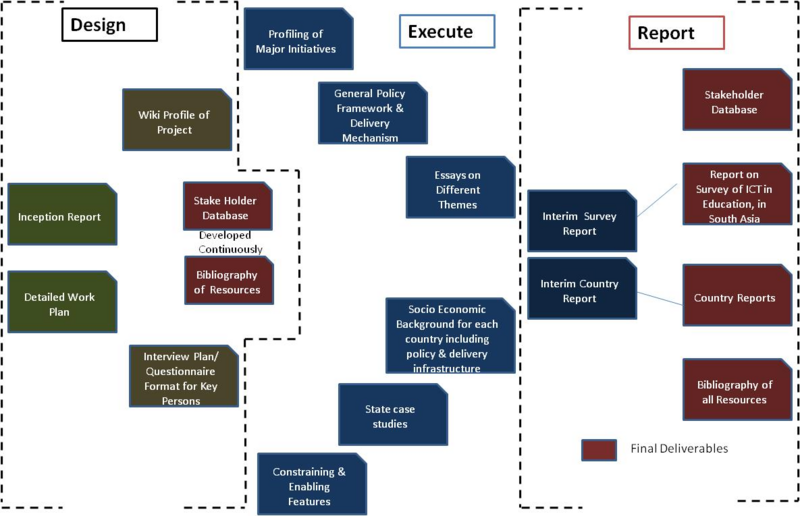ICT in Education - India & South Asia
| WikiProject: A Survey of ICT in Education for India and South Asia | |||||||||
Contents
| |||||||||
|
| A detailed Task list containing the activities, deliverables and the proposed methodology for undertaking each activity, under different phases can be found in the Link below: |
| ICT4SouthAsiaEd: Task Console |
 Stakeholder Workshops / Discussion Groups
Stakeholder Workshops / Discussion Groups
At various stages of the engagement, the team will discuss the deliverables as well as the work-in-progress with different key stakeholders to assimilate their feedback and also consult them to ensure that the work is in alignment with the engagement objectives.
Stakeholder Workshop - August, 2009 (Click here)
The First stakeholder workshop, was held on 10th August, 2009 at Delhi (India). This workshop was a prelude to initiating work on the survey commissioned by InfoDev and undertaken by PwC.
It involved participation from a range of stakeholders relevant to the study, such as:
- Government Departments
- Non Governmental Organizations including Academic Bodies & International Donors, and
- Private Companies in the field of content development
Paris Workshop - September, 2009 (Click here)
The Second Workshop, was held on 11th September, 2009 at Paris (France).
 Discussion Threads
Discussion Threads
The following links to various discussion topics are created to encourage everyone to post their comments and experiences with respect to India and other South Asian countries. Your invaluable contribution to the Survey shall be highly appreciated.
For any further query kindly mail me at: email_swati@yahoo.co.in
| Policy Framework for ICT in Education |
| Government Initiatives in Promoting ICT in Education |
| Quality Improvement through ICT in Education |
| Capacity Building for ICT in Education |
| Financing ICT in Education |
| Gender Equity and ICT for Education |
| Innovative use of ICT4Ed & Technological Innovation for developing Low Cost ICT products |
 Working Bibliography
Working Bibliography
This bibliography is the initial phase of this project, while its primary objective is to inform the process of developing reports that will focus on ICT developments in each India and South Asia, it is also being shared openly in the hope that it will be useful to others, and, more importantly, that others will add items and offer suggestions for improvement. The items in this collection have been selected on the basis that they provide data about ICT in education policy development and implementation processes; current projects; constraints in implementing ICT-enabled education; infrastructure development, teacher professional development and training, and digital education content development. The bibliography is therefore a potpourri of studies, evaluation reports, policy frameworks, news items and reports from numerous surveys that have been written since 2000.
We will be adding to the work as the country reports and theme papers proceed. The working Bibliography for each section shall be found under the respective sections.
*Note: all URLs were checked between August - October 2009. We hope you will join in the process.
- Victoria L. Tinio, “ICT in Education”, http://www.apdip.net/publications/iespprimers/ICTinEducation.pdf
- 2009, “Information Society Statistical Profiles 2009: Asia and the Pacific”, International Telecommunication Union (ITU-D)
- APDIP e-Note 17, 2007 “ICT Skill Development in the Asia-Pacific Region, Part two: Bridging the gap between demand and supply”, UNDP
- Caroline Haddad, Derek Elias, Shuichi Nakayama and Lucy Hargreaves, 2005, “A Situational Analysis of Education for Sustainable Development in the Asia-Pacific Region”
- Canada, Montreal. 2008. “Proposal for Internationally Comparable Core Indicators on ICTs in Education” UNESCO http://new.unctad.org. Prepared for the 2008 Global Event on Measuring the Information Society, Geneva, the paper analyses the selection process and principles behind the selection of the ICT indicators proposed by UIS http://new.unctad.org/upload/Global%20Event%202008/UIS%20paper%20on%20ICTs%20in%20ed%20core%20indicators%20edited%20version%20final.pdf.
- A.Gutterman, S.Rahman, J.Supelano, L.Thies, M.Yang, 2009. “White Paper: Information and Communication Technology (ICT) in Education for Development” GAID. http://unpan1.un.org/. The paper outlines the importance, challenges and recommendations for using ICT in education for select developing countries. http://unpan1.un.org/intradoc/groups/public/documents/gaid/unpan034975.pdf.
- India, New Delhi. 2009 “Facing Global and Local Challenges: The New Dynamics for Higher Education” UNESCO http://portal.unesco.org/geography/en/files/10906/12353684495Maldives/Maldives. Prepared for the UNESCO South, South-West, and Central Asia Sub Regional Preparatory Conference for 2009 World Conference on Higher Education.
- “Measuring the Information Society.” 2009. International Telecommunication Union. http://www.itu.int/ITU-D/ict/publications/idi/2009/material/IDI2009_w5.pdf. The paper introduces an ICT Development Index which captures the level of advancement of ICT in more than a 150 countries
- “Education For All: Global Monitoring Report” 2007, UNESCO. www.unesco.org/education/GMR/2007/Full_report.pdf. The study includes an assessment of progress towards the 6 Education For All Goals the world is committed to achieve by 2015.
- “Global Education Digest 2008: Comparing Education Statistics Across the World” UNESCO. www.uis.unesco.org/template/pdf/ged/2008/GED%202008_EN.pdf. The report is a cross national comparable data to help benchmark the progress towards the Millennium Development Goals
- Khuong Vu, 2006. “ICT Penetration and Economic Growth in Developing Asia: Issue an Policy Implications.” National University of Singapore. http://scid-new.stanford.edu/publicationsprofile/1035. The paper provides a global view on the diffusion of ICT and its contribution to economic growth in Asia.
- E. C. Lallana “An Overview of ICT Policies and e-Strategies of Select Asian Economies” Asia-Pacific Development Information Programme (APDIP) www.apdip.net/publications/ict4d/ict4dlallana.pdf.
- “Promoting ICT for Human Development in Asia, Realising the Millennium Development Goals.” 2004. United Nations Development Program. The paper is a research of nine Asian countries -- China, India, Indonesia, Malaysia, Mongolia, Pakistan, Sri Lanka, Thailand, and Viet Nam, exploring the potential of ICT applications towards achieving human development goals.
 Relavent Links
Relavent Links
- https://www.cia.gov/library/publications/the-world-factbook/
- http://www.developmentgateway.org/rc/filedownload.do?itemId=1115377
- http://www.nationmaster.com/graph/edu_edu_spe-education-spending-of-gdp#source
- http://web.worldbank.org/WBSITE/EXTERNAL/COUNTRIES/SOUTHASIAEXT/0,,menuPK:158851~pagePK:146732~piPK:146813~theSitePK:223547,00.html
- http://www.itu.int/ITU-D/ICTEYE/Indicators/Indicators.aspx
- http://zunia.org/cat/education/geo/1006/
- http://www.unapcict.org/activities/forum_intro.asp
- http://cms.unescobkk.org/index.php?id=1562
- http://www.unescobkk.org/fileadmin/user_upload/ict/e-books/Innovative_Case_Studies/Innovation.pdf
- http://www.unescobkk.org/index.php?id=1807
- http://cms.unescobkk.org/index.php?id=1698
